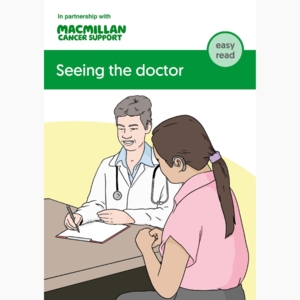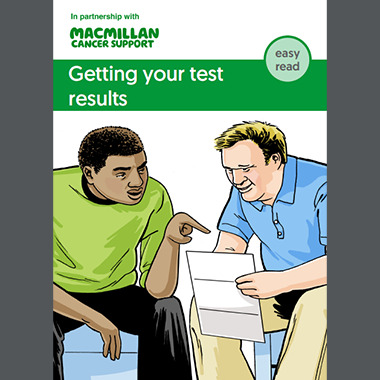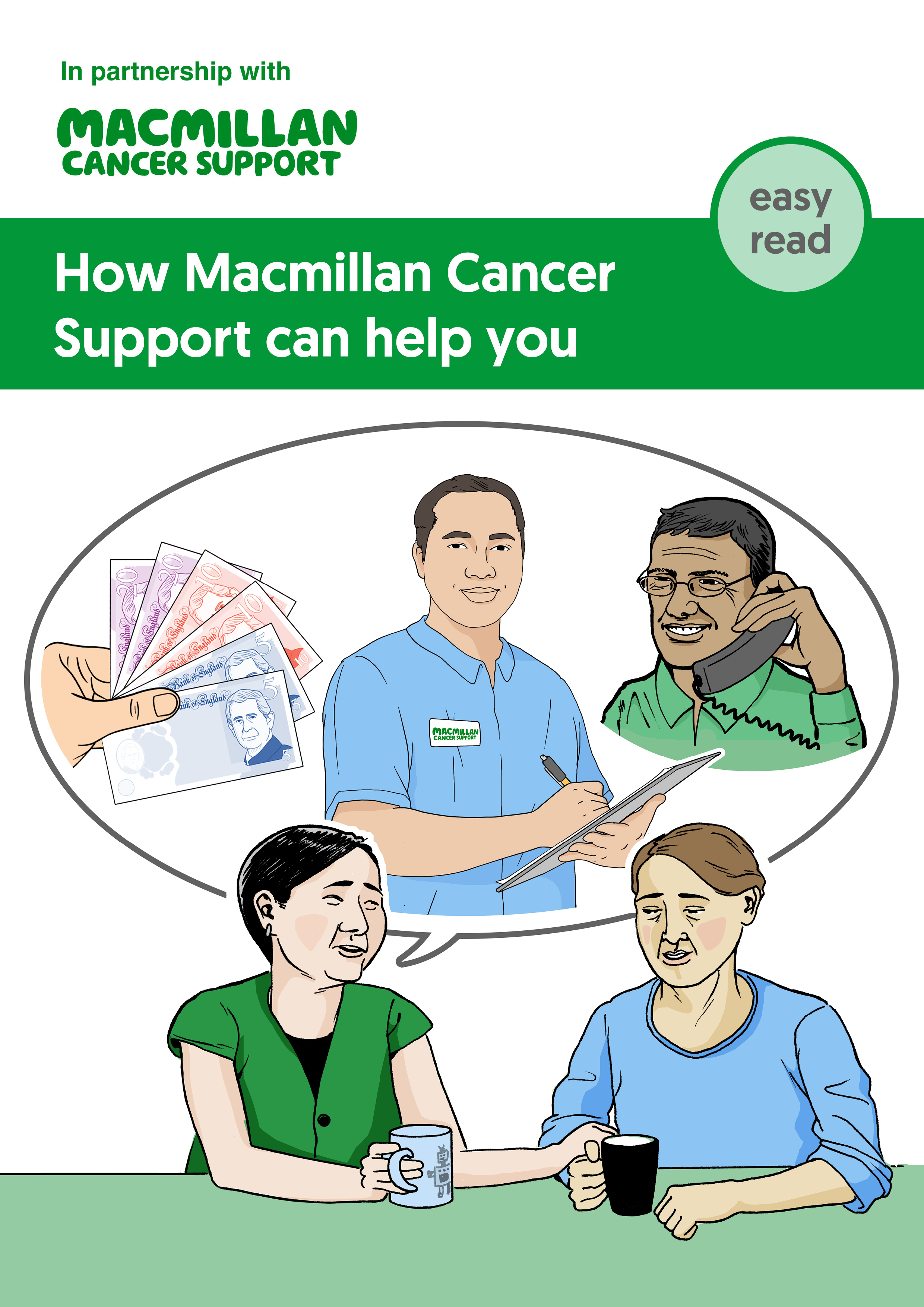Cancer tests and waiting for results
Going for cancer tests
If you have symptoms that are ongoing, unexplained or unusual for you, you usually need tests to find out what is causing them.
Some diagnostic tests that check for cancer can be arranged by your GP. Your GP is a local doctor who treats general medical conditions. Cancer tests can also be arranged by a specialist doctor at the hospital.
If you go to your GP with symptoms, they will examine you and ask questions to find out more. If you have certain types of symptoms, there are guidelines that help your GP decide what to do next. These guidelines explain:
- what tests the GP should arrange
- when the GP should arrange for you to meet a specialist doctor
- how quickly you should meet a specialist doctor.
If your GP thinks your symptoms could be caused by cancer, they will refer you to a specialist doctor. This will be a doctor who diagnoses and treats the type of cancer that could be causing your symptoms.
Going for tests or waiting to meet a specialist can be a worrying time. People often feel anxious while they are waiting to find out more. It is important to remember that symptoms do not usually mean you have cancer. But you may still need treatment.
If you need support while waiting for tests, or just want someone to talk to, call the Macmillan Support Line free on 0808 808 00 00.
Related pages
Booklets and resources
Questions to ask about cancer tests
Here are some questions you could ask your GP:
- Why are you referring me to a specialist?
- Are they a cancer specialist?
- When will I meet them? Is this an urgent referral or a non-urgent referral? Are you referring me as urgent or non-urgent?
- When and where will I have the tests?
- What are the tests for and what will they involve?
- Who will give me the results and when?
If you are pregnant
Related pages
Types of cancer tests and scans
There are many different types of tests and scans. The tests and scans you have will depend on the type of cancer and your situation. For example, you may have:
- a biopsy, where a doctor removes a small piece of tissue and looks at it under a microscope to check for cancer cells
- blood tests to check your general health, look for infections and help diagnose cancer
- scans and x-rays to look for signs of cancer inside your body.
Tests can help find out if you have cancer. They also give more information about the type of cancer and its stage. The stage of a cancer usually means how big it is and whether it has spread from where it started. This information helps doctors advise you about the best cancer treatment for you.
Related pages
What to expect at your test
Your healthcare team will explain what will happen at each test, and if you need to prepare for it. They will explain what the test is for and the possible benefits and risks of having it. They may give you a letter or leaflet with information about this. They should give you the information in a language and format that you can use, and make sure that you understand.
If you have questions about the test, it is okay to ask. It is important that you understand what it involves. If it helps, write down your questions before any appointment and take them with you to ask.
If something might make having the test difficult for you, tell your healthcare team. They may be able to help. If you have a disability, your healthcare team should make any changes you need.
If you would like someone to come with you to appointments, you can ask if this is possible. Check if they can come with you when you have the test. It is often useful having someone who knows you well to help and support you.
Some tests can be uncomfortable, but the staff will make you feel as comfortable as possible. Tell them if you have any discomfort during the test.
More information about tests
You can use our diagnostic tests A-Z to find out more about different cancer tests and scans.
We also have easy read information about having:
- a biopsy
- a colonoscopy
- a CT scan
- an endoscopy
- an MRI scan
- an ultrasound
- an x-ray
- examinations and blood tests.
Related pages
Waiting for cancer test results
It can take a few days to a few weeks for test results to be ready. Your healthcare team can tell you when your test results will be ready and how you will get the test results. They may give you contact details for someone in your team who you can ask questions during this time. This person is sometimes called your key worker.
You may have an appointment with your specialist, so that they can explain the results. They should use clear language and give you enough time to ask questions.
Many people feel anxious while they are waiting. You may feel like you have no control over what is going to happen to you. The waiting period might feel very long, and the future may feel uncertain.
There is no right or wrong way to deal with these feelings. Some people find it helps to carry on with your usual activities as much as possible. Continuing with everyday activities, such as going to work, can be a welcome distraction from worrying. Other people may feel they cannot concentrate on anything else.
Some people look for more information about cancer during this time. Searching for information can help you feel more in control while you wait for your results. But this is not always helpful.
Some cancer information can be confusing or upsetting. And you may find information that does not apply to you. Before looking for more information, it may be better to wait for the results and talk to your healthcare team. If you do decide to find out more, make sure the information is from a reliable source.
It may help to get support from family, friends or a support organisation.
Macmillan is also here to support you. If you would like to talk, you can:
- Call the Macmillan Support Line free on 0808 808 00 00.
- Chat to our specialists online.
Worried about waiting times?
The NHS aims to diagnose and treat cancer within a set period of time. Depending on where you are in the UK, there may be guidelines about how quickly you meet a specialist or have tests.
We have more about this in our information about cancer waiting times.
About our information
-
References
Below is a sample of the sources used in our diagnosis and staging information. If you would like more information about the sources we use, please contact us at cancerinformationteam@macmillan.org.uk
NICE. Suspected cancer: recognition and referral. NICE guideline [NG12]. Published: 23 June 2015. Last updated: 15 December 2021. Available https://www.nice.org.uk/guidance/ng12 (accessed June 2022).
Scottish Government. Scottish referral guidelines for suspected cancer. Jan 2019. Available https://www.gov.scot/publications/scottish-referral-guidelines-suspected-cancer-january-2019/ (accessed June 2022).
Northern Ireland Cancer Network (NICaN) Board. Northern Ireland Referral Guidance for Suspected Cancer. May 2007 Available http://www.belfasttrust-cancerservices.hscni.net/images/NICANReferralGuidanceMay2007.pdf (accessed June 2022).
-
This information has been written, revised and edited by Macmillan Cancer Support’s Cancer Information Development team. It has been approved by members of Macmillan’s Centre of Clinical Expertise.
Our cancer information has been awarded the PIF TICK. Created by the Patient Information Forum, this quality mark shows we meet PIF’s 10 criteria for trustworthy health information.
The language we use
We want everyone affected by cancer to feel our information is written for them.
We want our information to be as clear as possible. To do this, we try to:
- use plain English
- explain medical words
- use short sentences
- use illustrations to explain text
- structure the information clearly
- make sure important points are clear.
We use gender-inclusive language and talk to our readers as ‘you’ so that everyone feels included. Where clinically necessary we use the terms ‘men’ and ‘women’ or ‘male’ and ‘female’. For example, we do so when talking about parts of the body or mentioning statistics or research about who is affected.
You can read more about how we produce our information here.
Date reviewed

Our cancer information meets the PIF TICK quality mark.
This means it is easy to use, up-to-date and based on the latest evidence. Learn more about how we produce our information.






